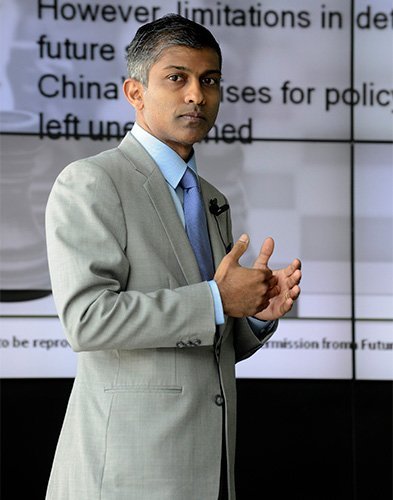Devadas Krishnadas has more than 20 years of experience in the public and private sectors. As CEO of Future-Moves Group, Devadas brings to the table his expertise in foresight, strategic planning and public policy formulation, implementation and evaluation. He has held senior positions in the Singapore government, such as in the Prime Minister’s Office, Ministry of Finance and Ministry of Home Affairs. Confronting Covid-19: A Strategic Playbook for Leaders and Decision Makers is his fourth book.

2020 is a year which will not soon be forgotten. Covid-19 brought international travel to a halt, posed a significant and real public health risk, and imposed dire economic impacts globally. No country was exempt or outside its reach.
Not only is Covid a global pandemic, but it is here to stay. The welcome news that more than one vaccine has proven effective is tempered by the reality of the challenging logistics of deploying the vaccine, and the unwelcome development that the virus has mutated into a more infectious strain.
However, it is evidentiary that different countries did better and for others, far worse in coping with Covid.
At the raw level, the difference in performance seems to be differentiated between the East and West, with countries in the East coping much better than countries in the West.
China, Hong Kong, Singapore, New Zealand, and Taiwan are examples of countries which have coped well with Covid while Italy, Spain, the United Kingdom and most notably the United States have not managed to get their Covid situations under control.
But the differentiation is not geographic. Countries such as South Africa have also done poorly, as have Japan and South Korea which have experienced multiple waves of infections.
What explains the differences?
The first answer lies with the quality of governance. Governance refers to more than government; it also involves the roles of businesses and the community. In countries with a strong ‘trust compact’, there was more effective policy action and greater compliance with precautions. Policy action was also evidence-based and swift. Tolerance for non-compliance with precautionary measures, both at the official level and the social level, was low. Such countries did well. Conversely, where the ‘trust compact’ was low, policy action was chaotic, incoherent, belated, and public compliance was low. This led to spiralling infection rates and comparatively high fatality rates.
The second answer lies in the quality of national leadership. Leaders such as New Zealand’s Prime Minister Jacinda Ardern, Singapore’s Prime Minister Lee Hsien Loong, and Taiwan’s President Tsai Ing-Wen showed themselves to be empathetic leaders who were also open and held themselves accountable. This gained public trust and cooperation. In contrast the bumbling and blame-assigning by President Trump and Prime Minister Johnson of the United Kingdom degraded public trust. In the case of Trump, he also promoted conspiracy theories and undermined his own officials struggling to manage Covid.
The third answer lies in multilateral cooperation and focusing on the challenge apolitically. Countries which cooperated with the World Health Organisation (WHO) and the publicprivate initiatives it led, such as the Friends of COVAX, contributed and benefited from information-sharing and building of Government-to-Government trust. These laid the foundation for amenable agreements on prioritisation, coordination, and cooperation in vaccine development and deployment.
In contrast, Donald Trump chose to politicise the challenge of Covid. He accused it of being caused by China, withdrew the United States from the WHO and withheld $400 million dollars in annual funding to the WHO. Consequently, US officials had to struggle on their own to find solutions to Covid.
The fourth answer lies in countries having faith in science and those which treated the virus as a hoax or as a ‘China virus’. Those countries which undertook science-based policy action also acted more swiftly and cogently.
Whereas those countries such as the United States and Brazil, whose leaders ignored the developing crisis – even when they had time to prepare a response – and spun conspiracy theories instead of focusing on the evidence, saw much worse outcomes for their populations.
It is ironic that as of December 2020, the United States, the global superpower, had the highest number of infections and highest number of fatalities and highest fatality rate.
The fifth answer lies in education. Countries which have high median levels of education had populations which could better understand the complexities of the challenge posed by Covid and were more accepting of the precautionary measures, as they could relate to the science behind them.
Countries with low median education levels, including many States within the United States – typically Republican controlled and rural, saw a pattern of treating the virus as a hoax and an indulgence in conspiracy theories. This persisted even as they endured, when compared to peer States with higher education levels, far higher infections and fatalities.
The sixth answer lies in political will. Countries which had leaders who had the political will to take and stick with hard calls such as imposing lockdowns, conducting surveillance for compliance and enacting penalty regimes for noncompliance fared far better than those whose leaders acted timidly, ignored the crisis, or who were inconsistent in their policies.
The final answer lies in whether countries had a historical record in investing in public health services. Those which did so, such as New Zealand and Singapore, had the capacity and capability to rapidly respond to Covid whereas countries which neglected their public health services, such as Italy, the United States and South Africa, fell behind the curve of the contagion.
Thus, explaining the differences in country experience with Covid is as complex as the virus itself. However, it is not a secret and the answers are visible. The only question that remains is whether countries will draw and apply the lessons in a timely enough manner to be better prepared to deal with the next pandemic.




